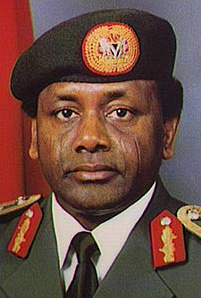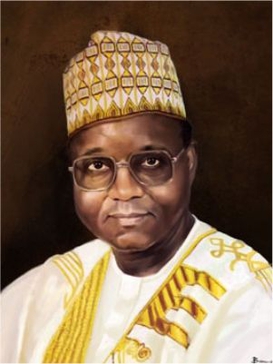Related Research Articles

Kenule Beeson "Ken" Saro-Wiwa was a Nigerian writer,television producer,and environmental activist. Ken Saro-Wiwa was a member of the Ogoni people,an ethnic minority in Nigeria whose homeland,Ogoniland,in the Niger Delta,has been targeted for crude oil extraction since the 1950s and has suffered extreme environmental damage from decades of indiscriminate petroleum waste dumping.

Sani Abacha was a Nigerian military officer and politician who ruled as the military head of state after seizing power in 1993 until his death in 1998. Abacha's seizure of power was the last successful coup d'état in Nigerian military history.
The Movement for the Survival of the Ogoni People (MOSOP),is a social movement organization representing the indigenous Ogoni people of Rivers State,Nigeria. The Ogoni contend that Shell Petroleum Development Company (SPDC),along with other petroleum multinationals and the Nigerian government,have destroyed their environment,polluted their rivers,and provided no benefits in return for enormous oil revenues extracted from their lands.

The Third Republic was the planned republican government of Nigeria in 1992 which was to be governed by the Third Republican constitution. In the Third Republic,there were democratically elected state governors and state assemblies and a democratically elected federal legislature. The republic was however not fully democratic as there was no democratically elected civilian president. The then military president Ibrahim Babangida's supposed transition eventually turned out to be a ploy to keep executive powers and grant the National Assembly limited legislative powers. Hence all laws passed by the Senate and House of Representatives will have to pass the National Defence and Security Council of Nigeria and finally approved by the President. So while Babangida changed the usual style adopted by preceding military leaders from Head of State to President,he will continue to postpone presidential elections and eventually annul the ultimate one held on 12 June 1993. the Third Republic can thus be described as half military and half civilian.
Okoh Ebitu Ukiwe is a retired Commodore in the Nigerian Navy who served as the de facto Vice President of Nigeria under military head of state General Ibrahim Babangida from 1985 to 1986.
Tai is a Local Government Area (LGA) of Rivers State in Nigeria. It covers an area of 159 km2 and at the 2006 Census it had a population of 117,797. It is part of the Okrika/Oyigbo/Tai/Eleme constituency of the Nigerian Senate,represented since April 2007 by George Thompson Sekibo. Tai local government headquartersis situated at Sakpenwa Christianity and traditionalism are widely practiced in the area and little Islamic religion In the April 2007 elections the Tai LGA recorded an implausible 99.6% turnout for the Governorship election. Celestine Omehia of the Rivers State People's Democratic Party was at first declared winner,but his election was later annulled and Rotimi Amaechi,also of the PDP,was declared governor. In February 2009,the Chairman of Tai Local Government Area was Barry Mpigi.
Abdulkareem AdisaListen was a Nigerian major general who was military governor of Oyo State during the military regime of General Ibrahim Babangida. He was convicted for involvement in an attempted coup against military head of state General Sani Abacha in 1997,and was on death row when Abacha died in June 1998. He was subsequently pardoned.
Allison Amaechina Madueke is a retired Nigerian naval officer. He was Chief of Naval Staff of Nigeria from 1993 to 1994,military governor of Anambra State from January 1984 to August 1985,and Imo State military governor from 1985 to 1986.
Clement David Ebri is a Nigerian politician who was elected on the NRC platform as Governor of Cross River State,Nigeria between January 1992 and November 17,1993 during the Nigerian Third Republic,leaving office after the military coup that brought General Sani Abacha to power. He was a strong supporter of General Ibrahim Babangida,who had initiated the short-lived third republic.
Lawan Gwadabepronunciation is a Nigerian military officer,he was Military Administrator of Niger State in Nigeria from December 1987 to January 1992 during the military regime of General Ibrahim Babangida. Gwadabe was one of the few men in the army enjoyed the best of life,training and privilege,known for his peculiar swagger,and handsomeness.He was accused of planning a coup against General Sani Abacha in 1995,for which he was jailed,tortured and convicted of treason. After Abacha's death he was granted a state pardon.
Melford Obiene Okilo had a long and distinguished career as a politician in Nigeria from the start of independence in 1960 until shortly before his death in 2008. He was a member of parliament (1956–1964) and a Minister in the Nigerian First Republic. He was the first elected Governor of Rivers State,Nigeria (1979–1983) during the Nigerian Second Republic. Later he was Senator for Bayelsa East,in Bayelsa State (1999–2003) during the Nigerian Fourth Republic.
Lt. Colonel Dauda Musa Komo was Administrator of Rivers State,Nigeria from December 1993 to August 1996 during the military regime of General Sani Abacha. He took office at a time of escalating violence between the Ogoni and Okrika people over crowded waterfront land,combined with Ogoni protest against Shell Oil activities and the environmental destruction of Ogoni land. He reacted aggressively,sending troops to break up demonstrations and arresting leaders of the Ogoni's MOSOP movement.
Mohammed Chris Alli is a retired Nigerian Army major general who served as Chief of Army Staff from 1993 to 1994 under General Sani Abacha's regime and was military governor of Plateau State Nigeria from August 1985 to 1986 during the military regime of General Ibrahim Babangida. Many years later,he was appointed interim administrator of the state during a 2004 crisis in the state following ethno-religious killings in Shendam,Yelwa Local Government.
Alhaji Dahiru Mohammed Deba is a Nigerian politician who was elected Governor of Bauchi State,Nigeria between January 1992 and November 1993 during the Nigerian Third Republic,leaving office after the military coup that brought General Sani Abacha to power.

Alhaji Mohammed Dabo Lere (1940–2002) is a Nigerian politician who was elected Governor of Kaduna State,Nigeria between January 1992 and November 1993 during the Nigerian Third Republic,leaving office after the military coup that brought General Sani Abacha to power.
Alhaji Abubakar Habu Hashidu was a Nigerian politician who served as governor of Gombe State from 1999 to 2003 under the platform of All People's Party (APP).
Lawrence Anebi Onojalisten was the military governor of Plateau State,Nigeria from 1986 to July 1988 and then of Katsina State until December 1989 during the military regime of General Ibrahim Babangida. He later became Principal Staff Officer to General Sani Abacha,before being arrested for alleged involvement in a coup attempt. He retired from the army in 1998,and after the return to democracy in May 1999 with the Nigerian Fourth Republic entered into politics.

Presidential elections were held in Nigeria on 12 June 1993,the first since the 1983 military coup ended the country's Second Republic. The elections was the outcome of a transitional process to civilian rule spearheaded by the military ruler,Ibrahim Badamasi Babangida. The unofficial result of the election –though not declared by the National Electoral Commission (NEC) –indicated a victory for Moshood Kashimawo Olawale Abiola of the Social Democratic Party (SDP),who defeated Bashir Tofa of the National Republican Convention (NRC). The winner of the election was thus never declared as the elections were annulled by Babangida,citing electoral irregularities. The annulment led to protests and political unrest,including the resignation of IBB and a weak interim civilian government,and culminated in the continuation of military rule in the country with Sani Abacha ascending to power as the military head of state via a bloodless coup later in the year.
Alex Ibru was a Nigerian businessman,founder and publisher of The Guardian (Nigeria) newspaper,who was minister of internal affairs from 1993 to 1995 during the military regime of General Sani Abacha.
References
- 1 2 "Nigeria States". WorldStatesmen. Retrieved 2010-03-29.
- ↑ "Rufus Ada-George". Rufus Ada-George. Archived from the original on 2011-06-22. Retrieved 2010-03-29.
- ↑ Femi Adesina (February 6, 2009). "I fear men like Shinkafi". Daily Sun. Archived from the original on January 18, 2010. Retrieved 2010-03-29.
- ↑ Mary Kate Simmons (1996). Unrepresented Nations and Peoples Organization: yearbook 1995. Martinus Nijhoff Publishers. p. 514. ISBN 90-411-0223-X.
- ↑ Steve Hiatt (2009). A Game As Old As Empire: The Secret World of Economic Hit Men and the Web of Global Corruption: Easyread Edition. ReadHowYouWant.com. p. 190. ISBN 1-4429-6149-X.
- ↑ Ademola Adeyemo (10 November 2009). "Sixteen Years After - Where Are Babangida's Civilian Governors?". ThisDay. Retrieved 2010-03-29.
- 1 2 George Onah (26 June 2008). "Ex-Gov Ada George Fingered in Okrika Crises". Vanguard. Retrieved 2010-03-29.
- ↑ CHRIS IKWUNZE (January 11, 2006). "HEAVENLY TEARS..As rain drenches sympathizers at burial of ex-governor's mother-in-law". Daily Sun. Archived from the original on December 30, 2006. Retrieved 2010-03-29.